- News
Shanghai General Hospital and Hungary's Semmelweis University Successfully Host an Exchange Meeting
https://mp.weixin.qq.com/s/l1vZdcGljuoywAgTWnNHPA
On the afternoon of December 7, Professor Nyirády Péter, Dean of the Faculty of Medicine at Hungary's Semmelweis University, visited Shanghai General Hospital. His visit served as a reciprocal gesture following our delegation's visit to Hungary in September and aimed to engage in in-depth discussions on collaborative disciplines, talent cultivation, and scientific innovation. The meeting explored the potential for future pragmatic cooperation and coordinated development between the two institutions.
The exchange meeting was attended by Zheng Xingdong, President of Shanghai General Hospital; Xia Shujie, Leader of the Urology Clinical Medicine Center; Han Bangmin, Vice President; Hu Guoyong, Vice President; Liu Wei, Vice Dean of the Clinical Medical School; Liu Fang, Director of the International Cooperation and Exchange Department; Sun Wei, Director of the Orthopedics Clinical Medicine Center; Jiang Juntao, Deputy Executive Director of the Urology Clinical Medicine Center; Bi Hai, Deputy Director of the Urology Oncology Department II; and Guo Sanwei, Associate Chief Physician of Urology, among others.
Opening Remarks and Institutional Introductions
Vice President Han Bangmin delivered the opening speech, introducing the attendees and emphasizing the significance of this rare exchange opportunity. He expressed hope that the event would pave the way for future academic and talent exchange collaborations. Vice President Hu Guoyong, in his welcoming address, reviewed the hospital's long-standing history and achievements, highlighted the clinical medical school’s strengths, and underscored innovations in talent cultivation, discipline development, and medical management. He expressed strong expectations for cooperation with Semmelweis University, particularly in urology, pancreatic surgery, and gastroenterology.
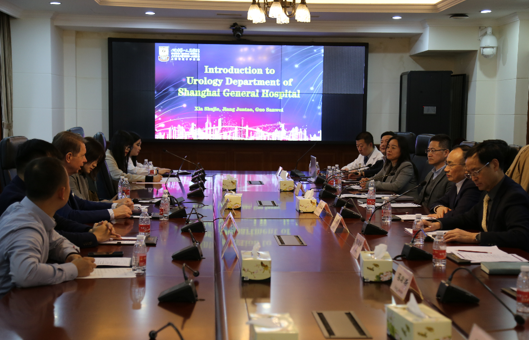
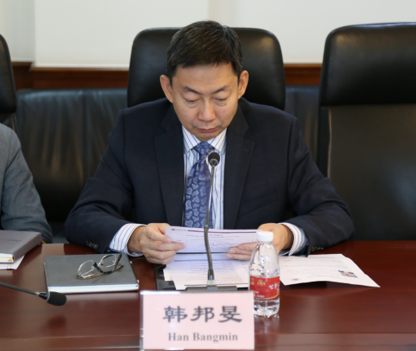
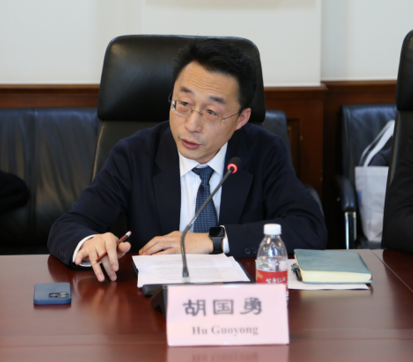
Presentation by Professor Nyirády Péter
Professor Nyirády, a prominent urologist and Director of the Urology and Urologic Oncology Center at Semmelweis University, presented a keynote lecture titled "Education and Research Developments in Urology at Semmelweis University." He introduced the university’s history, the rationale and outcomes of its medical education reforms, advancements in urological science, and ongoing international collaboration projects.
Semmelweis University, a leading European medical institution, excels in teaching, academic achievement, and global influence. With six faculties, multiple international campuses, and programs covering medicine, dentistry, pharmacy, and health sciences, the university adopts a trilingual teaching model (Hungarian, German, and English) and attracts students from 129 countries, with international students comprising 35% of its enrollment.
In recent years, the university has achieved notable success in integrating theoretical and practical medical education. Its second round of curriculum reforms, fully implemented in 2024, balances theory and clinical practice to enhance students' academic knowledge and practical skills. International collaborations span fields such as microbiomics, molecular oncology, and robotic-assisted surgical technology. Professor Nyirády shared the latest advances in robotic-assisted surgeries, including radical prostatectomy, partial nephrectomy, and cystectomy, analyzing their benefits for surgical outcomes and patient recovery.
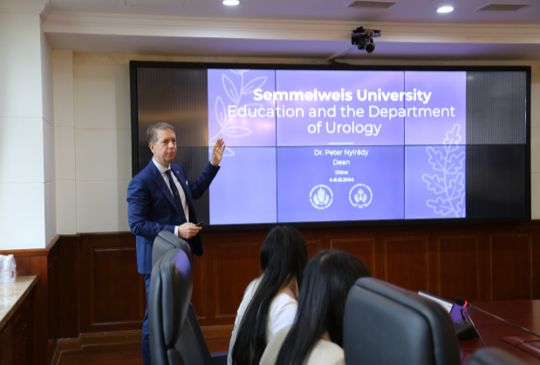
Shanghai General Hospital’s Achievements
Gu Ming, from the International Cooperation and Exchange Department, provided a comprehensive overview of Shanghai General Hospital’s history, strategic planning, and international collaborations, highlighting its innovations in medical education and research.
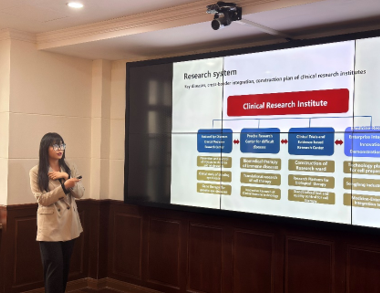
Associate Chief Physician Guo Sanwei from the Urology Clinical Medicine Center provided a detailed introduction to the department's team development, research directions, and clinical achievements.
First, he reviewed the historical development of the urology discipline, particularly the innovative advances in treating urinary system diseases in recent years, emphasizing the crucial role of teamwork in driving the discipline forward. He then shared the department's successful experiences in multidisciplinary collaboration, focusing on the application of minimally invasive and robot-assisted surgical techniques, highlighting how these methods deliver more precise treatments to patients. Additional remarks were made by Xia Shujie, leader of , Leader of the Urology Clinical Medicine Center, and Jiang Juntao, Executive Deputy Director (Songjiang Campus).
Dr. Guo also presented Shanghai General Hospital's latest research findings on “The Impact of Environmental Pollutants on Male Urogenital System Development Abnormalities.” Using comprehensive data and clinical cases, he deeply analyzed how environmental pollutants, especially endocrine-disrupting substances, affect the normal development of the male urogenital system, sparking lively discussion and profound reflection.
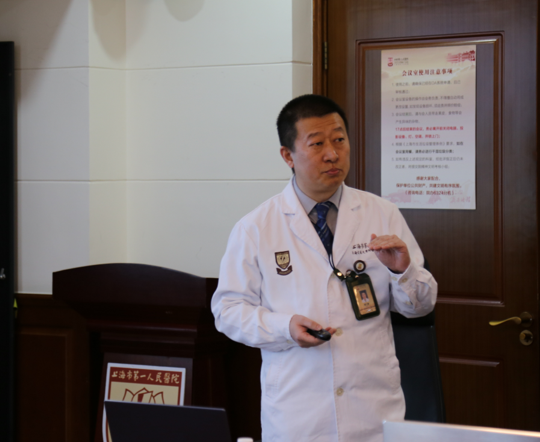
During the exchange session, both parties engaged in in-depth discussions and enthusiastic exchanges on topics such as discipline education, talent cultivation, clinical practice, and scientific research collaboration.
President Zheng Xingdong expressed his great pleasure in resuming in-depth exchanges with colleagues from Hungary. He noted that currently, eight researchers from Shanghai General Hospital are engaged in academic exchange activities at the Translational Research Center of Semmelweis University. He hoped that the September visit, research exchange training, and this symposium would serve as a catalyst for substantial cooperation between the two sides.
President Zheng highlighted the importance of enhancing cooperation in talent cultivation, suggesting the organization of student exchange programs, joint training initiatives, and the development of personalized training plans that combine the teaching strengths of both institutions while broadening international perspectives. Medical professionals should also participate in regular exchanges and short- to medium-term advanced training to gain firsthand understanding of different healthcare systems and cultural contexts. Additionally, he proposed organizing joint academic activities, such as symposiums and challenging case discussions, to cultivate a cohort of urology professionals with both expertise and international competitiveness.
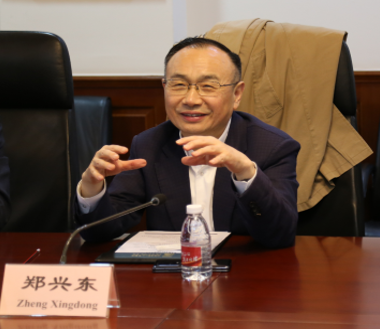
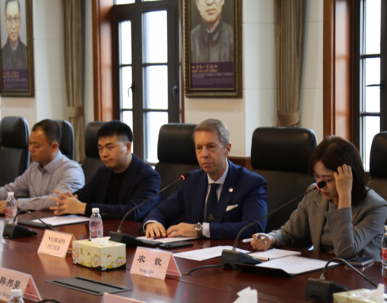
Professor Nyirády wholeheartedly agreed and expressed enthusiastic support. He expressed willingness to engage in comprehensive cooperation with Shanghai General Hospital in multiple dimensions of urology development.
In the field of medical education, he proposed exploring the establishment of a student exchange mechanism, conducting teaching guidance and academic lectures to enhance teaching quality and the internationalization of education. Regarding research collaboration, he suggested strengthening doctor-to-doctor exchanges and remote consultations, as well as conducting collaborative surgical demonstrations to promote the application of advanced diagnostic and therapeutic technologies.
Associate Dean Liu Wei from the Clinical Medical School provided a detailed introduction to the undergraduate and postgraduate curriculum design at Shanghai General Hospital. He acknowledged Semmelweis University's emphasis on clinical professional practice and student preferences in its curriculum reforms and expressed a strong desire to strengthen student collaborations.
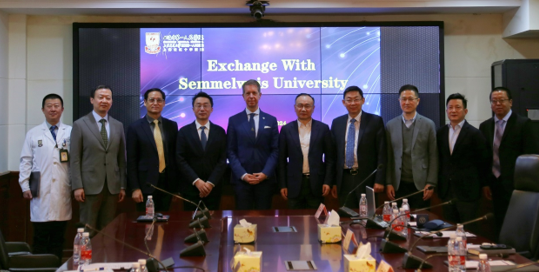
After the meeting, Professor Nyirády was invited to visit the Urology Clinical Medicine Center; at Shanghai General Hospital. Professor Xia Shujie provided a comprehensive overview of the center’s development, research focus, and cutting-edge technologies and achievements in the diagnosis and treatment of urological diseases. Professor Nyirády highly praised the hospital's professional standards and technical facilities in urology and expressed great anticipation for deeper collaboration in the field of urology.
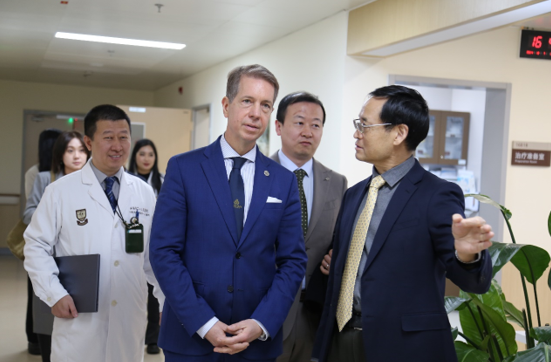
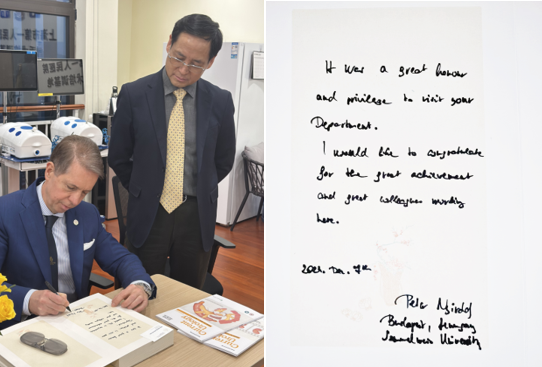
(Message from Professor Nyirády at the Minimally Invasive Surgery Training Base of the Urology Department)
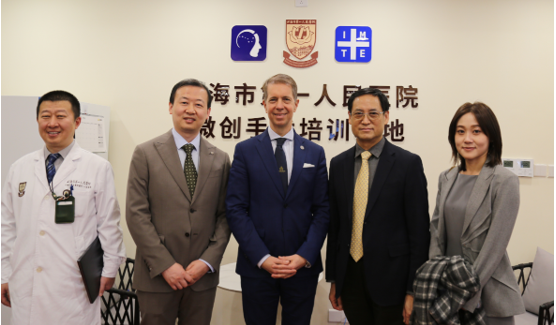
The successful hosting of the exchange meeting with Semmelweis University in Hungary has not only strengthened the friendship between the two institutions but also laid a solid foundation for future collaboration in medical research, clinical treatment, and talent cultivation. Both parties unanimously agreed to continue strengthening communication, accelerate the development of urology, and student exchange programs, and explore more collaborative research models to drive shared progress in the medical field. Shanghai General Hospital will remain committed to this cooperative project, enhancing communication with an open mindset, and actively responding to the "Belt and Road" initiative to jointly advance medical development between China and Europe.
Editor: International Cooperation and Exchange Department: Wang Yuhan, Gu Ming
